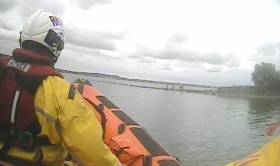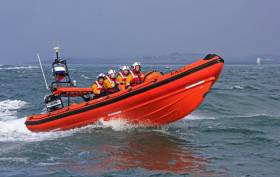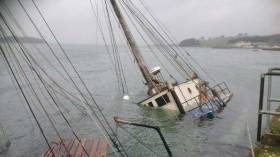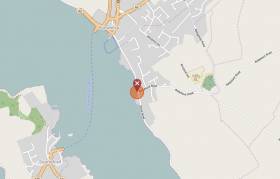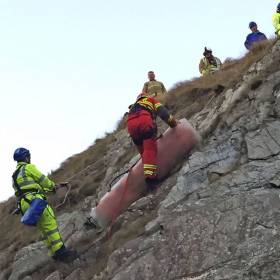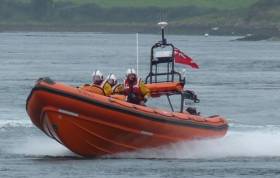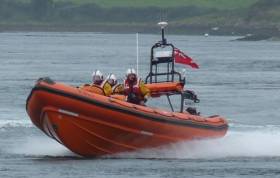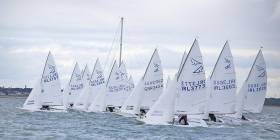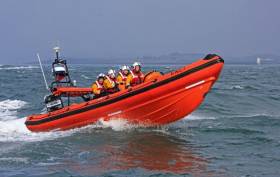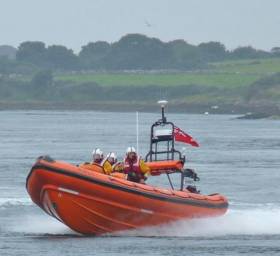Displaying items by tag: Portaferry
#RNLI - Portaferry RNLI was called out yesterday afternoon (Wednesday 28 June) to rescue a group of four people who had become stranded on an island at the north end of Strangford Lough.
The two women and two children had become stranded on Rough Island, a small island which lies just off Island Hill in Strangford Lough between Newtownards and Comber in Co Down.
The island is accessible on foot at low tide via a concrete causeway connecting the mainland to the small island. However, the group had been cut off when the causeway submerged with the incoming tide.
The coastguard request to launch was received by Portaferry RNLI at 4.34pm and the volunteer lifeboat crew were on the water six minutes later, arriving on scene at 5.06pm.
Weather conditions at the time were partly cloudy with good visibility and calm seas.
The women and children were taken on board the lifeboat and transported the short distance to safety on shore. Once satisfied they were out of danger, the lifeboat crew returned to station ready for service.
#RNLI - The volunteer lifeboat crew at Portaferry RNLI responded for the second time in 48 hours to a launch request yesterday evening (Thursday 4 May) to go to the aid of five men on board a 7m yacht experiencing difficulty on Strangford Lough.
The Atlantic 85 inshore lifeboat launched at 8.45pm for the reported location of the casualty, which was just north of Don O’Neill Island in Strangford Lough.
The lifeboat crew arrived on scene at 8.52pm in clear weather and good visibility, but with a Force 6 north-easterly was creating choppy sea conditions with a moderate two-metre swell.
The five men on the sailing boat had experienced some heavy going and though they were in no longer in any immediate danger, the lifeboat crew made the decision to escort them into the safe waters of Ringhaddy Sound.
Less than 48 hours previously, the Portaferry lifeboat crew launched to the aid of five men and two women stranded on two adjacent islands in Strangford Lough.
The group had been on a 6m cabin cruiser that started to experience electrical problems before they decided to beach the craft on Salt Island, after three of the party were put ashore on neighbouring Green Island.
The Portaferry Lifeboat crew arrived on scene at 11.22am, nine minutes after launch, and took on board the five people on Salt Island, taking them to Killyleagh before returning to Green Island for the remaining individuals.
At the time of the launch, the weather was sunny with very good visibility, a Force 3 easterly wind and calm sea conditions.
Commenting on the rescue, Portaferry RNLI lifeboat operations manager Brian Bailie said: “Once again all the hard work and hours invested in training has paid off with a happy ending to today’s rescue.
“With the start of the good weather and more and more craft taking to the water, it is increasingly important that everyone respects the water and makes all the necessary checks before going on the water.”
'Urgent' Assistance Sought to Raise Sunken Schooner in Portaferry
Afloat.ie has received an 'urgent' appeal for Tall Ship enthusiasts to help with a sunken 100–foot schooner in Portaferry Harbour. William Mulhall says he wants to return the 1935–built vessel to her 'former glory' but is seeking the assistance of a 'Tall Ship enthusiast to raise her and give her a refit'.
As Afloat.ie previously reported the schooner contained up to 1,000 litres of diesel fuel and had been moored in the harbour for some time, up to 18 months according to local reports.
BBC news says although a diesel spill in the area will clear up relatively quickly, the salvage operation to move the Regina Caelis could take months.
It is understood specialist equipment that is capable of bearing the weight of the boat, which is more than 200 tonnes, will need to be brought in.
Mulhall appealed for assistance via email: 'I have a tall ship sunk on the 27/1/17 in 20 foot of water still tied to the harbour and lying on her starboard side, in Portaferry, Co.Down, Northern Ireland
The Schooner Regina Caelis built in 1935 is 108ft long with a 40ft bow sprit and 10 sails, she has 3 masts and an engine BMA fitted in 1955.
I urgently need a Tall Ship enthusiast to raise her and give her a refit on slip and return her to former glory. I am open to ideas, partners, groups and shares'.
Contact details supplied : [email protected] or telephone at: 02844841301
Sunken Boat Sparks Strangford Lough Fuel Spill Fears
#StrangfordLough - Leaking fuel from a submerged boat in Strangford Lough has promoted environmental concerns, as BelfastLive reports.
The three-masted vessel, which has been moored in Portaferry Harbour for some time, crashed into the quay, and sank on Friday (27 January).
And there are now fears of a major pollution incident after some of the 1,000 litres of diesel still on board began leaking into the lough.
The nearby Exploris Aquarium has among others taken the precaution of closing its intake from Strangford Lough, which is a Special Protection Area for marine wildlife.
BelfastLive has more on the story HERE.
Portaferry Lifeboat In Multi-Agency Rescue Of Man In Ardglass Cliff Fall
#RNLI - Volunteers from Portaferry RNLI went to the aid of a man who had fallen down a cliff at Ardglass Golf Club on the Co Down coast yesterday (Tuesday 27 December).
The Portaferry lifeboat, an inshore Atlantic 85, launched at 2.55pm just minutes after the launch request from the coastguard to join a multi-service response which included the Northern Ireland Fire Service Specialist Rescue Team, coastguard units from Portaferry, Newcastle and Kilkeel, the PSNI, Northern Ireland Ambulance Service and Rescue 936, the HM Coastguard helicopter from Carnarvon in Wales.
According to Independent.ie, it’s understood that the casualty had slipped down a 30ft gorge at the Ardglass golf links around 2.20pm.
Arriving on scene at 3.17pm, one of Portaferry’s volunteers went ashore to offer assistance to the other members of the emergency services already attending the casualty.
The decision was taken to bring the man to the top of the cliff, where a landing area had been prepared for the rescue helicopter to airlift him to Belfast City Airport for transfer to Royal Victoria Hospital. Portaferry RNLI remained on scene while the casualty was recovered.
Three Callouts In Two Days For Portaferry Lifeboat
#RNLI - Portaferry RNLI has urged the public to be vigilant and to take care near or on water this summer following three callouts in two days for the Co Down lifeboat station.
The volunteer lifeboat crew was first put into action on Friday afternoon (29 July) when during a routine exercise, the inshore lifeboat observed three people on a small inflatable boat that had broken down and was on a rock off Killyleagh. Weather conditions at the time were described as good with the sun shining and a slight breeze.
Following unsuccessful attempts to restart the engine, the lifeboat crew offered their assistance and proceeded to take the three onboard and bring them safely back to shore in Killyleagh.
The lifeboat launched for a second time on Friday evening following a 999 call from a bystander on the shore at the northern end of Strangford Lough.
At the scene the crew found a man was using a small tender boat to get out to his yacht, which was on a mooring between the islands. However, with the tide rushing between the islands at six to seven knots, it was making conditions difficult. The lifeboat went alongside the boat and ensured the man made his way safely to the yacht.
The lifeboat crew was called on for a third time shortly after 6pm on Saturday (30 July) when a 10m yacht with one onboard broke down and was becalmed off the north rock in Cloughey, Portavogie. Conditions at the time were good with an easterly Force 2 wind blowing, some cloud and a calm sea.
Once on scene, the lifeboat crew observed that the engine had lost power and proceeded to work with the yachtsman to establish a towline before bringing the vessel safely into Portavogie.
Speaking following what has been a busy period for the station, Portaferry RNLI lifeboat operations manager Brian Bailie said: "We would encourage everyone visiting the coastline this summer to enjoy themselves but to remember to respect the water.
"Always wear a lifejacket and always have a means for calling and signalling for help and ensure everyone know how to use it. Always check the weather forecast and tide times.
"Make sure someone ashore knows where you are going and who to call if you don’t return on time. Learn how to start, run and maintain your engine and always carry tools and spares."
Portaferry Lifeboat Rescues Three Lost In Thick Fog
#RNLI - Volunteers with Portaferry RNLI went to the aid of three men on board a 4m dory who had become lost in thick fog close to Ballyhornan on the Co Down coast on Thursday (9 June).
At the time of launch at 4.45pm, the weather was extremely foggy with very poor visibility, a Force 2 southerly wind and smooth sea conditions.
The three men had become lost in the worsening conditions and were unsure of their exact location. Rather than try and guess their location, they called emergency services for help, giving a rough position as somewhere between Sheepland Harbour and Guns Island, just off the Co Down coast.
Portaferry RNLI headed towards the men’s general location and at first passed the three men in the thick fog. On arrival at Sheepland Harbour, however, the lifeboat crew started to track back towards Guns Island.
By this time the men on board the lost vessel had called the coastguard once more to report that they had heard the engines of the lifeboat passing by, helping to pinpoint their location.
The lifeboat crew arrived on scene close to Guns Island at 5.15pm, attaching a tow rope and proceeding to tow the boat into Ballyhornan Bay, where the three men went safely ashore before the lifeboat returned to station.
Following on the rescue, Portaferry RNLI lifeboat operations manager Brian Bailie said: "The three men made the correct decision when they called for help.
"They had become lost and disorientated in thick fog and rather than try to blindly find their own way to shore, they called for help and remained in the area they last believed they were.
"This made our job a lot easier and I am delighted that our volunteer crew have helped bring these men safely to shore."
The Flying Fifteen Northern Championships will take place in Strangford Lough this weekend and will be hosted by Portaferry Sailing Club. There should be some great racing as up to twenty boats are expected in what is the first regional event of the season.
Favourites will be UK guest helm Charles Apthorp sailing with Alan Green (NYC) but current holders and National champions Dave Gorman & Chris Doorly (NYC) as well as local sailors Shane McCarthy, Andy McCleery, Brian McKee and Brian Willis among others will also be looking to have a say in where the silverware goes.
This year is the 30th anniversary of the foundation of the Flying Fifteen Association of Ireland and its first President and Flying Fifteen stalwart Jim Rodgers will be presenting the prizes to mark the occasion.
#RNLI - The volunteer lifeboat crew at Portaferry RNLI responded to a launch request from the coastguard yesterday morning (Saturday 30 April 2016) to assist two men on board a yacht stranded on rocks in Strangford Lough, Co Down.
Portaferry's inshore Atlantic 85 launched at 9.22am and the volunteer crew were quickly on scene at Long Rock, just off East Down Yacht Club, 10 minutes later.
Weather conditions at the time was cloudy with good visibility, a Force 3 north westerly wind and calm sea.
When the RNLI crew arrived, they fixed a line to the 28ft yacht and towed it off the rocks.
Once their yacht was free, the two men on board proceeded to East Down Yacht Club accompanied by the Portaferry lifeboat crew, who remained with the yacht until it was safely returned to the pontoons at the yacht club.
After the callout, Portaferry RNLI lifeboat operations manager Brian Bailie said: "It has been a busy few months for the crew in Portaferry and we were delighted to have been able to assist these two men who had run into some difficulty.
"We are now entering our most busy time of year and we would urge everyone taking to the water to make sure that they prepare properly and check that all equipment is tested and in good working order."
The RNLI offers sea safety advice online at RNLI.org/RespectTheWater
#RNLI - Portaferry RNLI's volunteer lifeboat crew were called out yesterday afternoon (Sunday 17 April) to assist a 36ft angling vessel which had run into difficulty north of the South Rock Light Buoy near Portaferry, Co Down.
The alarm was raised just before 12.25pm and the lifeboat was dispatched to the scene, some 10 miles east of the lifeboat station.
The angling boat, with three people on board, had developed engine problems in what were described as calm conditions with a Force 3 wind and a slight sea swell.
When on scene, the lifeboat crew checked everyone was okay before taking the vessel under tow to Portavogie, arriving there at 2pm. The lifeboat was back on station at 2.30pm.
Commenting on the callout, Portaferry RNLI lifeboat operations manager Brian Bailie said: "This was a fairly routine callout for the lifeboat crew and we were glad to be able to offer assistance.
"However as we approach the busy season and more people are taking to the water for leisure we would advise the public to make sure they check all their equipment is in proper working order."
The RNLI offers sea safety advice online at RNLI.org/RespectTheWater



























